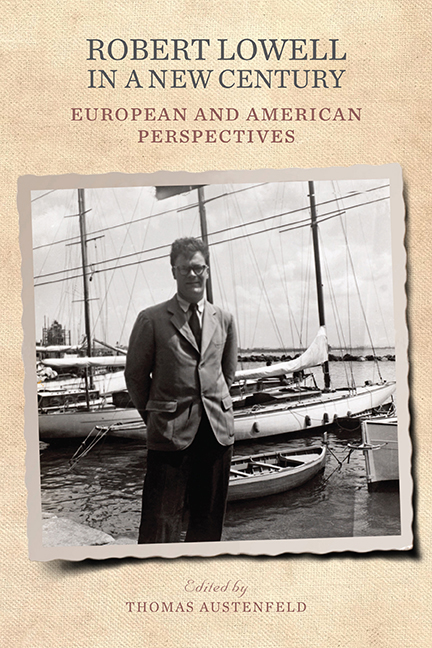Book contents
- Frontmatter
- Dedication
- Contents
- Acknowledgments
- Introduction
- 1 Revisiting Robert Lowell's Mental Hospital Poems
- 2 Sensual Drift and Ethnic Longing in Robert Lowell
- 3 Reworking the Same Water: Robert Lowell Transported
- 4 “Sweet salt embalms me”: A Hippocratic Approach to the Role of the Sea in the Poetry of Robert Lowell
- 5 More Delicate Than the Historian's Are the Map-Maker's Colors: Correspondences between Lowell's Poetics of History and Bishop's Poetics of Space
- 6 Robert Lowell and Ezra Pound's Economics
- 7 Robert Lowell and Ezra Pound in Washington and Rapallo
- 8 “Why Holland?”: Robert Lowell in Amsterdam
- 9 Lowell and Ungaretti: Imitations and Beyond
- 10 Robert Lowell's Credo
- 11 “Marriage? That's another story”: Reconsidering the Marital Trope in Robert Lowell's Poetry
- 12 “Oh No”/“Yes Yes”: Lowell and the Making of Mistakes
- 13 Robert Lowell: The Power of Influence
- Notes on Contributors
- Index
7 - Robert Lowell and Ezra Pound in Washington and Rapallo
Published online by Cambridge University Press: 26 June 2019
- Frontmatter
- Dedication
- Contents
- Acknowledgments
- Introduction
- 1 Revisiting Robert Lowell's Mental Hospital Poems
- 2 Sensual Drift and Ethnic Longing in Robert Lowell
- 3 Reworking the Same Water: Robert Lowell Transported
- 4 “Sweet salt embalms me”: A Hippocratic Approach to the Role of the Sea in the Poetry of Robert Lowell
- 5 More Delicate Than the Historian's Are the Map-Maker's Colors: Correspondences between Lowell's Poetics of History and Bishop's Poetics of Space
- 6 Robert Lowell and Ezra Pound's Economics
- 7 Robert Lowell and Ezra Pound in Washington and Rapallo
- 8 “Why Holland?”: Robert Lowell in Amsterdam
- 9 Lowell and Ungaretti: Imitations and Beyond
- 10 Robert Lowell's Credo
- 11 “Marriage? That's another story”: Reconsidering the Marital Trope in Robert Lowell's Poetry
- 12 “Oh No”/“Yes Yes”: Lowell and the Making of Mistakes
- 13 Robert Lowell: The Power of Influence
- Notes on Contributors
- Index
Summary
Poi si rivolse, e parve di coloro che corrono a Verona il drappo verde per la campagna; e parve di costoro quelli che vince, non colui che perde.
—Dante, InfernoROBERT LOWELL WAS poetry consultant at the Library of Congress in 1947–48 and saw much of Ezra Pound in this period. He had already approached Pound at age nineteen, in May 1936, asking permission to become his student in Rapallo, and those early letters are full of a young beginner's enthusiasm but also insights. Lowell already points out that Pound's dictum of “the fewest possible words” should be replaced by “reality (boredom, religion, anything) expressed with the utmost vitality,” and that Pound's diction is at least as strange as Milton's. Lowell was to continue to defend Milton and to exalt Virgil, the poet of Augustus, against Pound's strictures (Letters, 223, 227, 231): “Sometimes I think you were born in Sioux City instead of Venezia.” On a later occasion he tells Pound he wishes that the poet had reread his own Pisan Cantos and pruned them! But of course their bulk is part of their success. The relationship with Pound reveals that Lowell was insatiable for experience, and persistent in going after his masters and keeping up a running argument with them and his peers. In the present paper I will consider some littleknown interactions, or intersections, between the two poets, especially in relation to Lowell's elegy for his mother, “Sailing Home from Rapallo,” and to their concern with Dante.
Lowell has a way of treating his masters as equals, with enviable assurance. His casual comments on The Cantos are a useful guide to that forbidding poem. For example, reading the journalist Lincoln Steffens on the Russian Revolution, Lowell tells Pound, with perhaps a touch of adulation:
I was astonished at the wonderful job you have done on his beginning of the Russian Revolution. Your section has been in my mind for twenty years, yet the original is only a piece of buoyant journalism. A few phrases cleaned up, a touch of setting, the right rhythm. You beat anyone at opening windows and letting air into your poem. (September 17, 1956, Letters, 260)
As Saskia Hamilton tells us in her notes to Lowell's Letters, this is a reference to a passage in Canto 16, the closing pages of Pound's first complete book of Cantos (I–XVI, 1925).
- Type
- Chapter
- Information
- Robert Lowell in a New CenturyEuropean and American Perspectives, pp. 95 - 104Publisher: Boydell & BrewerPrint publication year: 2019



